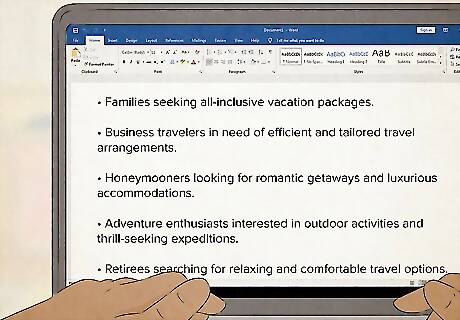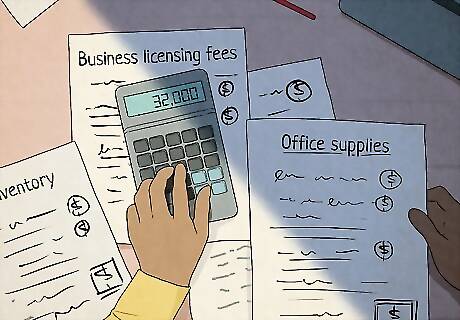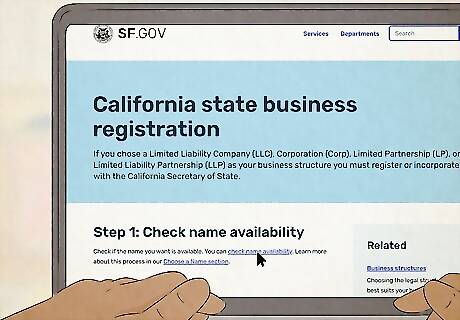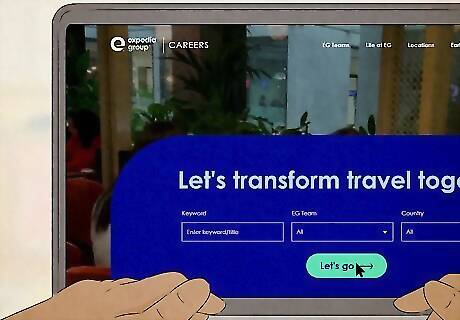
views
- Figure out what you want to specialize in as a travel agent and what sort of client base you want.
- Get established by creating a budget and learning about the industry before coming up with a business name, and registering your company.
- You could sign up with a host agency instead, doing research to determine which one is best suited to your skills and interests.
Determining Your Specialty in the Travel Market

Consider what sort of travel agent you wish to be. Resist the urge to instantly become a travel agent for all people interested in all destinations. Due to the limitless competition you will face on the internet, aim to be a sought-after expert, rather than a jack-of-all-trades. Just as a restaurateur must settle on a cuisine, menu, and customer demographic, start thinking about what sort of packages and destinations you would like to offer to which sort of people. Two distinct types of travel agents are “corporate” and “leisure” agents. The former makes arrangements for companies whose personnel who must travel for their work. The latter books personal vacations for individuals. Leisure agents may specialize in terms of themes (such as adventure or romantic getaways), destinations (with a thorough knowledge and plenty of advice for their customers), or clientele (catering to those traveling on a budget or those with unlimited means).

Write down your interests. Increase your passion for the job and your chances of success by focusing on areas that already fascinate you. First, jot down your interests in general terms, even if they seem to have nothing to do with travel. Then create a second list of destinations that you loved visiting or would love to go to. Compare the two lists. Try to pair your interests with specific destinations that pertain to them to double your enthusiasm. For example: If fine wine is on your list of interests, pair it with areas on your list of destinations that include wine countries, such as France, Italy, or California. London would be an area to focus on if you have a passion for English literature. If you are obsessed with great white sharks, think about Australia, Baja, and South Africa.

Determine your client base. Imagine yourself back in the role of travel agent. Now picture who you would most like to see going off on your dream vacation in your place. Consider not just the destination, but the nature of your dream travel package. Perhaps most importantly, consider how much money you envision your ideal customers spending. Contact other travel agents for quotes to get a rough idea of the going price for the sort of dream trips you would like to offer your own clients. Use this price information to determine what sort of income your clients would need to afford these trips. Factor in any age restrictions that may further narrow your potential client list down. A wine-tasting tour, for example, would most likely eliminate families traveling with children, while cage-diving with sharks might appeal more to younger adults than senior citizens.
Laying the Groundwork for Your Business

Create a budget. Set aside money to cover essential equipment for an online business. These items include a phone, a fax machine, a website, and a computer with Internet access and a printer. Also anticipate having to possibly pay fees for the following: Training and certification Registering as a business

Use available resources to learn about the industry. If you know anyone who works as a travel agent, treat them to a cup of coffee so you can pick their brain. Visit online forums and message boards that are specific to the industry to see what issues insiders talk about. Join professional networks. Subscribe to publications that are dedicated to the business. GT Trends, Traverse, and YTP Travel Network are prominent professional networks in the industry. Trade-specific publications include Agent@Home, Recommend, Travolution, Travel Agent Central, and Travel Trade.

Come up with a name for your business. Since your business will be based online, keep it short so people can remember and search for it easily. Google each name you think of to see if that specific domain name has already been taken and/or if that exact company name has already been registered by another entity. Also take note of the top hits that come up with each search. Even if the name you want is currently free, consider something different if your website is likely to come 50th in a list of other popular searches. For example, let’s say that you personally share the same name as Donald Trump. Since a Google search will bury any mention of you online under a million other sites regarding the Don, come up with a business name that does not incorporate your own name in any way. Including the core concept of your speciality in your business name can increase its prominence in keyword searches for those terms. For example, “California Wine Tours” is self-explanatory as well as being the exact phrase someone would Google to find more information about that topic.

Register your business. Consult a lawyer and/or tax accountant about which classification best suits your business: sole proprietor, partnership, LLC, or corporation. As a small business, you will most likely register as a sole proprietor. In that event, ask your lawyer if local or state laws require you to register a “Doing Business As” (DBA) name with those governments. Such registrations as DBA’s are often what is meant by a “travel agent license.” In this sense of the word “license,” you are essentially paying a nominal fee and filling out some paperwork in order to work from a residence, as opposed to taking classes and passing exams in order to earn a driver’s license.

Separate your personal and business finances. Apply for an Employer Identification Number (EIN) to use for tax purposes in lieu of your Social Security number. Open a bank account specifically for your business to keep better track of company expenses. If your business needs a credit card in addition to the debit card that comes with your new bank account, apply for a new credit card to be used exclusively for your company. These steps are not strictly necessary to start your business, but will help keep you organized.

Utilize your contacts. Review the people in your life. Consider all categories: family, friends, friends of friends, neighbors, classmates, co-workers, passing acquaintances. Ask yourself if there is anyway they can help promote or otherwise assist your business. For example, if you would like to specialize in wine-tasting tours to the Napa Valley and your neighbor’s son works at a hotel there, ask for his contact information. Or if you plan to arrange group trips to major sporting events, keep the diehard sports fans in your life in mind as possible links to future customers. Use social media like Facebook and Twitter to link your business to your existing contacts. Increase your visibility. Ask them to like your website and share your posts so others in their network see you in their own feeds. Ask people you know to refer potential customers to you. Encourage them by offering prizes or thank-you gifts for referrals who end up booking trips with you.
Joining a Host Agency

Consider signing up up with a host agency. Although you are free to start an online travel agency that is totally independent of any other business entity, consider starting as an independent contractor for a host agency instead. Transition into your new career with less stress by utilizing their pre-existing infrastructure. Learn the trade and gain insight into what is needed to construct your own successful business before attempting to start one from scratch. Host agencies will provide: Training Community support Lower overhead

Research agencies. There are numerous host agencies out there, so take the time to familiarize yourself with any given one before applying to join. Read customer reviews to see if the company’s brand is sought after by the public or avoided at all costs. Visit forums frequented by current and former agents who worked with them to find out what sort of experiences they had. Call each agency to discuss information that may not have mentioned on their website. Ask about: What sort of commission they offer and the method of payment. Which software programs you will need and whether they offer a discount if you purchase the tech through them instead of the open market. The amount of training that is required and what amount of continued education is offered after that. What sort of community support is offered between you, other independent contractors, and the agency itself. Exactly how much you will be charged to sign up, as well as any fees that may be required later on.

Determine which is best suited for you. Once you have made contact with agencies and familiarized yourself with their operations, weigh their answers to your questions against your own personal needs. First and foremost, consider those that already offer travel within the niche market that you have decided to specialize in. Additionally, ask yourself the following: Would you rather work for a large company with extensive resources, or a smaller one with DIY spirit and more intimate connections between workers? Are you fine working remotely with people you will never meet, or would you rather work for a local business that occasionally gets together? Does the training that they offer seem to cover everything you need to learn, or do you feel that you will still be overwhelmed afterward?

Sign up with the agency. The process for each agency will vary, but expect to pay an application fee. If they offer a training and certification course, the application fee may cover these, or they may be billed separately. Complete the coursework assigned in the specified amount of time to receive certification. Courses may be designed to be entirely online, by correspondence, or a combination of the two. Certification is not a legal requirement to be a travel agent, so if the host agency does not offer their own certification process, you can still apply and possibly be hired. If you wish to work for this specific company and boast about being certified at the same time, you can seek certification through organizations like the Travel Institute.















Comments
0 comment